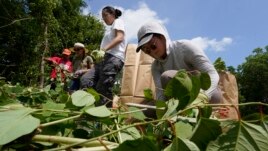27 August 2022
Asa Peters walked into a forest near Kingston, Massachusetts this summer and started cutting down a plant called Japanese knotweed.
"It's hard. You got to keep pulling and pulling...but it's cool," he said.
It was difficult work in the hot August weather. Peters and other Native American volunteers were working to bring the land back to how it was before European settlers arrived in North America. That means taking away the kinds of trees and plants that were not believed to be there 500 years ago.

Fin Jonas, of Falmouth, Mass., a member of the Mashpee Wampanoag tribe, top center, and Jessica Tran, right, of St. Paul, Minn., work to remove invasive plant species at the Wampanoag Common Lands project, in Kingston, Mass., Tuesday, Aug. 2, 2022. (AP Photo/Steven Senne)
He said the idea is "to create a special place where we can do all kinds of great things."
The Wampanoag Common Lands project aims to turn the land back to how it was long ago when members of the Mashpee Wampanoag tribe used it for ceremonies.
The land is next to a body of water called Muddy Pond. It is less than 10 kilometers from where settlers known as Pilgrims started the English colony of Plymouth about 400 years ago.
Ramona Peters started a group called the Native Land Conservancy. She said the 13 hectare piece of land is "where the first impact of colonization of this country happened."
Beth Rose-Middleton is a professor who studies Native American environmental policy and conservation at the University of California, Davis. She said the Wampanoag Common Lands project is part of a movement to preserve and restore native culture.
She said the projects help fight climate change because many areas where Native Americans live have been "depleted," or used up. She said taking care of the land in the way the Native American groups plan to might help it become "resilient."
Native American groups are having trouble living in the places where they have been for many years. Extremely dry weather in the American Southwest is causing problems for tribes there. In the wetlands of Louisiana, native groups are worried about flooding from powerful storms.
The group in Massachusetts hopes to copy a similar project in Northern California. In October of 2019, the Associated Press reported that the Wiyot Tribe has worked for 20 years to restore an island in Humboldt Bay that was polluted.
Michelle Vassel is the administrator of the Wiyot Tribe. She called the work "healing." She said that is because the island is where an attack on the Native people by white settlers took place in 1860. The attack killed many people and the tribe almost died out.
Vassel said the attack was "a scar on the community" and the work to bring the island back to health "was a way to change that history."
Like the Wiyot Tribe, the Wampanoag Common Lands project hopes to make the pond and forest a better home for animals.
Old buildings have been torn down. Sports areas have been cleared. Even large trees that are not native to Massachusetts have been taken out.
New trees and plants were put in this summer. They include white oak trees, blueberry bushes and witch hazel plants.
Cameras have been set up to look for the return of animals like otters.
If new buildings are put on the land, they will be traditional Wampanoag shelters made for guests or other community events.
Asa Peters said he hopes to return one day to see how the plants he put in are doing. He also wants to find out how the people are using the land.
"My hope for it is to be a beautiful, comfortable space," Peters said. "A place where people can come and it helps fill them back up."
I'm Dan Friedell.
Dan Friedell adapted this story for VOA Learning English based on reporting by the Associated Press.
_____________________________________________________________________
Words in This Story
cool–adj. (informal) appealing to young people
impact –n. the effect or influence of something
preserve –v. to keep something as it was in the past
restore –v. to return to an earlier condition
resilient –adj. able to become healthy or strong again after something bad has happened
scar –n. a mark that is left after a wound heals
comfortable –adj. producing a good physical feeling; not unpleasant